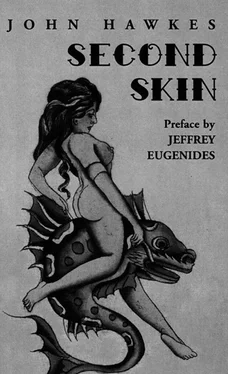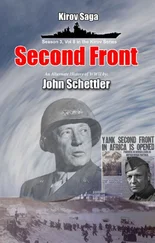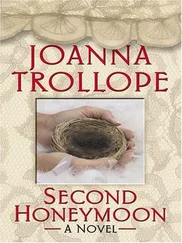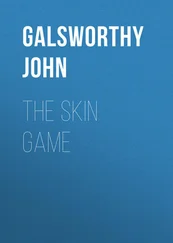“Pixie and I were alone, mother and daughter, and we did what we had to do. I think she disapproved at first, but once I got the kerosene out of the garage she began to enjoy the whole thing immensely. She even clapped her little hands. But you ought to have known,” taking note of the ribbon, touching it with the tip of her pinky — no other sign than this — and all the while whispering, whispering those minimum formal cadences she had learned at school and gently moving, turning, arching her bare neck so I should see how she disciplined her sorrow, “you ought to have known the U-Drive-Inn was no place for a child. …”
I blushed again, I glanced down at the small bare feet in the strapless shoes — scuffed lemon shells — I welcomed even this briefest expression of her displeasure. “It was no place for you, no place for you, Cassandra,” I said, and wished, as I had often wished, that she would submit to some small name of endearment, if only at such times as these when I loved her most and feared for her the most. A name of endearment would have helped. “You were too innocent for the U-Drive-Inn,” I said. “I should have known how it would end. Your mother always told me she wanted to die surrounded by unmarried couples in a cheap motel, and I let her. But no more cheap motels for us, Cassandra. We won’t even visit Gertrude in the cemetery.”
She caught my spirit, she caught my gesturing hand: “Skipper?”—at least she allowed herself to whisper that name, mine, which Sonny had invented for me so long ago before we sailed —“Skipper? Will you do something nice for me? Something really nice?”
She was still unsmiling but was poised, half-turned, giving me a look of happiness, of life, in the pure agility of her body. And hadn’t she, wearing only the frock, only a few pins in the small classical lift of her hair, hadn’t she come straight from a sluggish bath tub in the U-Drive-Inn to the most violent encounter ever faced by her poor little determined soul? Now she held before me the promise of her serious duplicity, watching and gauging — me, the big soft flower of fatherhood — until I heard myself saying, “Anything, anything, the bus doesn’t leave for another hour and a half, Cassandra, and no one will ever say I faltered even one cumbersome step in loving you.” I gripped her small ringless hand and fled with her, though she was only walking, walking, this child with the poise and color and muscle-shape of a woman, followed her through the drunken sailors to the door.
In the dark, whipped by pieces of paper — the tom and painted remnants of an old street dragon — a sailor stood rolling and moaning against the wall, holding his white cupcake-wrapper hat in one hand and with the other reaching into the sunken whiteness of his chest, the upturned face, the clutching hand, the bent legs spread and kicking to the unheard Latin rhythm of some furious carnival. But on flowed Cassandra, small, grave, heartless, a silvery water front adventuress, and led me straight into the crawling traffic-it was unlighted, rasping, a slow and blackened parade of taxicabs filled with moon-faced marines wearing white braid and puffing cherry-tipped cigars, parade of ominous jeeps each with its petty officer standing up in the rear, arms folded, popping white helmets strapped in place — led me on through admiring whistles and the rubbery sibilance of military tires to a dark shop which was only a rat’s hole between a cabaret — girl ventriloquist, dummy in black trunks — and the fuming concrete bazaar of the Greyhound Bus Terminal — point of our imminent departure — drew me on carefully, deftly, until side by side we stood in the urine-colored haze of a guilty light bulb and breathed the dust, the iodine, the medicinal alcohol of a most vulgar art.
“But, Cassandra,” I said in a low voice, flinching, trying to summon the dignity of my suffering smile, all at once aware that beneath my uniform my skin was an even and lively red, unbroken, unmarked by disfiguring scars or blemishes, “look at his teeth, smell his breath! My God, Cassandra!”
“Skipper,” she said, and again it was the ghostly whisper, the terrifying sadistic calm of the school-trained voice, “don’t be a child. Please.” Then she whispered efficiently, calmly, to the oaf at the table — comatose eyes of the artist, the frustrated procurer, drinking her in — and naturally he was unable to hear even one word of her little succinct command, unable to make out her slow toy train of lovely sounds. He wore a tee-shirt, was covered — arms, neck, shoulders — with the sweaty peacock colors of his self-inflicted art.
“There’s no need to whisper, lady,” he said. Up and down went his eyes, up and down from where he fell in a mountain on his disreputable table, watching her, not bothering to listen, flexing his nightmare pictures as best he could, shifting and showing us, the two of us, the hair bunched and bristling in his armpits, and even that hair was electrical.
She continued to whisper — ludicrous pantomime — without stopping, without changing the faint and formal statement of her desires, when suddenly and inexplicably the man and I, allied in helpless and incongruous competition, both heard her at the same time.
“My boy friend is bashful,” she was saying, “do you understand? Let me have a piece of writing paper and a pencil, please.”
“You mean he’s afraid? But I got you, lady,” and I saw him move, saw his blue tattooed hand swim like a trained seal in the slime of a drawer which he had yanked all at once into his belly.
“Father, Cassandra, father!” I exclaimed, though softly, “Pixie’s grandfather, Cassandra!”
“No need to worry. Skipper,” said the man — his grin, his fiendish familiarity—“I’m a friend of Uncle Sam’s.”
Yellow and silver-tinted, prim, Cassandra was already sitting on the tattooer’s stool, had placed her purse on the table beside her, had forced the man to withdraw his fat scalloped arms, was writing with the black stub of pencil on the back a greasy envelope which still contained — how little she knew — its old-fashioned familiar cargo of prints the size of postage stamps, each one revealing, beneath a magnifying glass, its aspect of faded pubic area or instant of embarrassed love. Alone and celebrating, we were war orphans together and already I had forgiven her, wanted to put my hand on the curls pinned richly and hastily on the top of her head. I could see that she was writing something in large block letters across the envelope.
She stood up — anything but lifeless now — and between his thumb and finger the man took the envelope and rubbed it as if he were testing the sensual quality of gold laminated cloth or trying to smear her tiny fingerprints onto his own, and then the man and I, the oaf and I, were watching her together, listening:
“My boy friend,” she said, and I was measuring her pauses, smelling the bludwurst on the tattooer’s breath, was quivering to each whispered word of my child courtesan, “my boy friend would like to have this name printed indelibly on his chest. Print it over his heart, please.”
“What color, lady?” And grinning, motioning me to the stool, “You got the colors of the rainbow to choose from, lady.” So even the oaf, the brute artist was a sentimentalist and I sat down stiffly, heavily, seeing against my will his display of wet dripping rainbow, hating him for his infectious colors, and telling myself that I must not give him a single wince, not give him the pleasure of even one weak cry.
“Green,” she said at once — had I heard her correctly? — and she took a step closer with one of her spun sugar shoes, “a nice bright green.” Then she looked up at me and added, to my confusion, my mystification, “Like the guitar.”
Читать дальше












